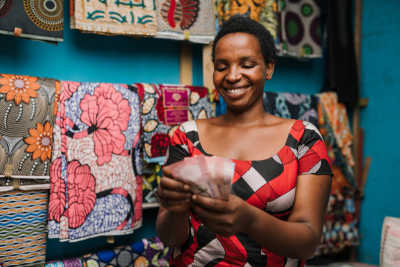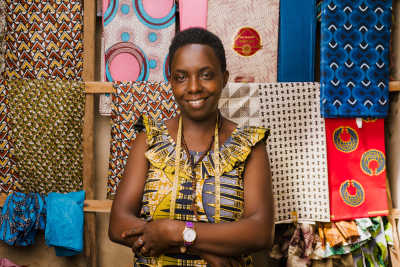
Having access to services such as banks, loans, savings accounts and credit is something we can take for granted – it’s an essential part of everyday life. But for millions of people around the world – disproportionately women – these services are non-existent, which makes planning for the future and reaching goals much harder.
Talking about finances can be a difficult and often a taboo topic – especially when saving options and education is limited. Keeping money under the mattress can feel much more appealing than trusting it to a bank. In 2017, Comic Relief and Jersey Overseas Aid united to launch Branding Out: Financial Inclusion at the Margins, a programme that helps rural communities in Zambia, Rwanda and Sierra Leone to understand and take control of their personal finances, get back on their feet and plan for their future.
There are many barriers within these communities that stop people using banking services – distance can be a huge factor for those living in rural communities and language and terminology around things like on interest rates, withdrawals and services charges can be overwhelming for those who’ve never banked before.
Which is why Branching Out was created to help tackle the reasons why millions of people are ‘financially excluded’. The programme focuses on three main areas:
1. To offer practical support to the unbanked by helping people start saving groups, open bank accounts, move money and plan for the future
2. Provide technical assistance to local governments to help them communicate when new services and technologies are introduced
3. And support FinTechs (technologies, companies and organisations that help consumers or financial institutions deliver financial services innovatively) to provide new ways of doing business both in large cities and rural locations where movement and communication takes longer.
FSD Zambia is one of the organisations we support through the programme. They do incredible work in rural communities’, such as savings groups, to help more people access financial advice and services, enabling them to save money, manage their income and access loans to better support themselves and their families.
FSD Zambia’s work has helped women, families and other local entrepreneurs start a savings group which has transformed the way they run their businesses and manage money. Over time this work can be life changing, as the project has seen with Agness, a businesswoman who joined a local savings group that started in her village in Luapula Province. Thanks to the project, Agness’ life has completely changed, allowing her to build a fully functioning grocery shop and to start building a house for her family.
“Our lives improved so much due to the savings we got”
Agness lives with her husband, Moses, and their three children, in a village in the Luapula province of Zambia. With the help of Moses, Agness runs a successful grocery shop, supplying food and essential items to people in their local community. Just a few years ago, Agness was struggling to make ends meet.
She was selling a small selection of items including salt, soap, and lotion from her home and earning very little profit but since joining the local savings group, set up thanks to the Comic Relief and JOA partnership, Agness has learnt about saving, investment and loans.
Agness said: “I heard that there was a group teaching people about saving money. I got interested and joined - we were taught a lot about how to save money and use it in business.
Our lives improved so much due to the savings we got. From our money we started buying iron sheets, bricks and cement, and finally we built our shop!
We used the money we borrowed for farming. We had a field for maize, cassava and the remaining amount was injected back in the business and used to pay back the loans.
Business is good now because I am able to borrow money from the group and buy more goods for my shop than I wasn’t able to in the past, before I had somewhere to borrow the money.
I want to use my money to put my children through school and also to build a house for them, so that even when I die, they will still remember this group and will never forget it.
I want to encourage women to join this group… and to remember that you can save [very little] and your money will still grow big because of interest.”
Agness has gained the confidence to start borrowing and investing in her business and runs a fully functioning grocery shop from her savings. As well as her business, she has also been able to start building a house for her family to live in.
It’s experiences like Agness’ that capture the life changing and tangible impact of the Branching Out programme in Zambian communities. There is still more work to be done though, and we’re excited to support more people as our partnerships continues. Over the next few weeks, we’ll be sharing more news about the programme, including some Covid-19 research that is currently underway, the results of technical assistance (information, expertise and skills training) projects in Rwanda and Zambia, the work of partners such as Accion, The Toronto Centre and FINCA. Stay tuned!
José Morell-Ducós is Portfolio Manager for Financial Inclusion and manages Branching Out: Financial Inclusion at the Margins, a four-year £8 million partnership between Jersey Overseas Aid and Comic Relief. The partnership focuses on financial inclusion as a vehicle for development in Rwanda, Sierra Leone and Zambia.


